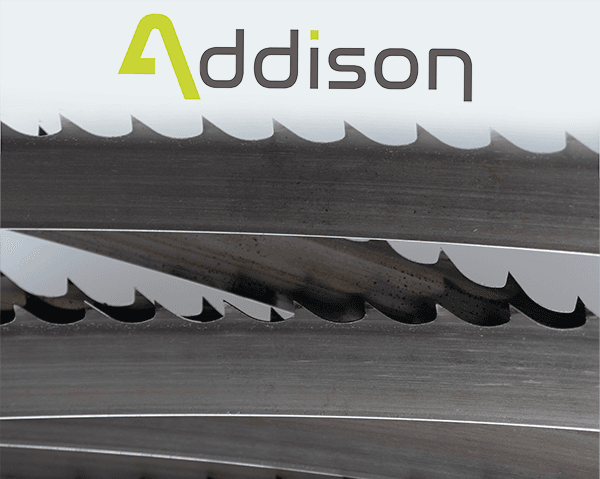Bandsaw Blade Basics: The Different Types of Bandsaw Blades
There are many different types of bandsaw blades available on the market, and each type has its own specific use in manufacturing. In this article, we are going back to basics and taking a closer look at the three most common types of blades – carbon steel blades, bi-metal blades, and carbide-tipped blades. We will also briefly discuss the main applications for each type of blade.
Carbon Steel Bandsaw Blades
Carbon steel bandsaw blades are probably the most common type of blade used for general-purpose, light production cutting. Made from heat-treated, high-carbon steel to increase their hardness, carbon blades are typically used for cutting wood, plastic, and non-ferrous metals. Carbon blades can also cut paper and foam materials, generally anything a little softer using lower cutting speeds.
Carbon blades also come in 2 variations – A flexible blade, (known as Flexback in most brands) ideal for wood, rubber or non-ferrous metals (even cork). Or there’s the option for a harder backed blade – commonly known as Hardback. Suited to cutting hard woods, mild steels and some plastics at lower speeds. Hardback allows greater blade tension – it’s the ultimate choice for straight cuts.
Bi-metal Bandsaw Blades
Bi-metal bandsaw blades are probably the most commonly used sawblade for metal cutting, they are made from two types of metal – a high-speed steel cutting edge welded to a softer backing material. These blades are designed for cutting through a variety of ferrous and non-ferrous metals, such as stainless steel, cast iron, alloy steels, structural steels, tool steels and aluminium. Bi-metal blades tend to last 5-10 times longer than carbon blades when used correctly and with a quality cutting lubricant. There are also variable tooth pitch blades to consider within this range. The variable pitch reduces harmonic vibrations which is especially useful when cutting wood and making very fine cuts. Bi-metals are known as general purpose bandsaw blades because of their versatility, and this makes them the perfect choice for high production environments cutting a variety of materials.
Carbide Tipped Bandsaw Blades
Carbide-tipped bandsaw blades are made from tungsten carbide, which is an extremely hard material that cuts through materials that even bi-metal blades can’t. The Carbide allows for high cutting rates when using with tough, exotic or abrasive materials, such as concrete and stone or high nickel alloys. These blades are also recommended when the cutting process creates high temperatures, as they can withstand more heat than other materials. Carbide tipped, or TCT bandsaw blades give an excellent cut finish, and their durability tends to be favoured in heavy production environments where increased cutting life is vital.
Summary
The three types of blades each have their own specific uses. Carbon steel blades are best for cutting wood, plastic, and non-ferrous metals. Bi-metal blades are general purpose sawblades designed for cutting through all sorts of materials at higher speeds. Carbide-tipped blades are best for cutting through very hard materials, such as concrete and stone and in heavy production.
If you still have question about the best blade for your job, give us a call on 01384 264 950 or complete our contact form and we will get back to you as soon as we can!


